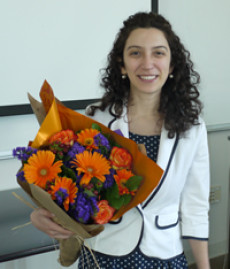Didem Unat, 2012 Alvarez Fellow
May 30, 2012
As the new 2012 Luis W. Alvarez Fellow, Didem Unat will be designing programming models for future exascale architectures, as part of the Hardware Software Co-design project in Berkeley Lab's Computational Research Division. Specifically, Unat will be evaluating the performance of fluid dynamics and combustion kernels on current architectures, and projecting their performance on future systems. She will be targeting data locality issues and providing novel programming concepts for improving performance on exascale systems.
As a graduate student at the University of California, San Diego, Unat designed the Mint programming model and implemented an accompanying compiler to facilitate programming on graphics processing units. She notes that the model relieves the programmer of a variety of tedious tasks such as managing threads and data locality. Unat's Ph.D. work was funded by Simula Research Laboratory.
"As an Alvarez Fellow, I intend to continue my research in this area, designing and developing programming models to make the lives of scientists easier," says Unat.
A native of Niksar, Turkey, Unat fell into computer science as an undergraduate at Bogazici University in Istanbul.
"In Turkey, we have to take a nationwide exam to be eligible to go to a university, I ranked second in the exam in Math, which allowed me to go any university and any department in the country. I love Istanbul. So it wasn't so difficult to choose the university, but I didn't have any knowledge in terms of field of studies," says Unat. "By luck, I picked computer science, then a year later I realized that I made the right decision."
But it wasn't until her third year at Bogazici University, while she was studying abroad and interning at the National Center for Supercomputing Applications in Illinois, that Unat decided to specialize in supercomputing.
"I had a computer account on the Tungsten machine, which was the third fastest computer in the world at the time (in 2005), and was fascinated by the computational power it had," says Unat. "Until that internship, I typically emulated MPI processes on my single processor machine and sometimes scaled up to four processors at the most. I wasn't planning to get a Ph.D. until I spent the summer at the supercomputing center."
Currently a resident of North Oakland, Unat enjoys biking, hiking and exploring new cultures and cuisines on her spare time. She also recently adopted a new cat named Lemon who is making good use of her collection of conference laser pointers. She is very thankful to her parents and her sister for being supportive and letting her travel halfway across the world to purpose her career.
About Computing Sciences at Berkeley Lab
High performance computing plays a critical role in scientific discovery. Researchers increasingly rely on advances in computer science, mathematics, computational science, data science, and large-scale computing and networking to increase our understanding of ourselves, our planet, and our universe. Berkeley Lab’s Computing Sciences Area researches, develops, and deploys new foundations, tools, and technologies to meet these needs and to advance research across a broad range of scientific disciplines.







 Instagram
Instagram YouTube
YouTube